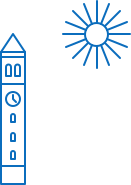Study in Ireland



Capital Dublin

Currency Euros

Language English & Irish

Population 4.9 Million

GDP $410 billion

Dialling Code +353
Ireland is an island nation located on the west coast of Europe. It is the continent’s second largest island after Great Britain. It is a member of the European Union and it is known for its beautiful green countryside, fascinating history and friendly people.
Over the last few years, Ireland has emerged as a preferred destination for Indian students looking to study abroad. The Irish education system is considered to be one of the best in the world. The Irish qualifications are recognised world-wide. In addition to all this the Irish economy is one of the fastest growing among the European Union and the 6th most competitive in the world.
More than a thousand big, mostly American global companies have operations in Ireland, among them: Google, Apple, Facebook, PayPal, Microsoft, Yahoo, eBay, AOL, Twitter and Intel. Pfizer, Boston Scientific and Johnson & Johnson also have a major presence there
Ireland is home to some of the finest universities in the world. Some of the key fields Irish universities specialise in include the natural sciences, technology, economics, and the humanities. Across Ireland, there are two dozen universities and institutes of technology to you can apply to.
In addition to the above Ireland is consistently ranked in the world’s top 20 countries for high quality of life, peace, and human development. The Irish are known for their welcoming and friendly approach. They love their conversations and are probably the best people to make you laugh.
Almost all Irish institutes and universities offer two (2) major intakes also known as Semesters :
| Autumn/Semester 1 | Starts early September |
| Spring/Semester 2 | Starts late January |
Application submission deadlines to apply varies from institute to institute in Ireland and our advice to students is to apply at least 3 to 4 months before the course start date.
You can apply for a study visa up to 3 months before your date of travel to Ireland.
You must apply online for a visa via the department website.
After you have completed the online application process; you must follow the instructions on the summary application form that is created by the online system. The summary form will contain information on where you are to submit your supporting documentation. The summary form which you must print, sign and date must be submitted with your supporting documentation. You may be required to provide your Biometrics information as part of the application process.
The current visa fees for visas are:
(This fee cannot be refunded if your application is refused or withdrawn)
You can pay it in local currency. You may be required to pay additional charges e.g. relating to the submission of your documents.
International students who have the Stamp 2 permission are allowed to take up casual employment. They can work up to 20 hours a week during term time and up to 40 hours a week in the holidays. Holiday periods have been standardised - June to September inclusive and from 15 December to 15 January.
| Study Level | Average Annual Fee (in Euros) |
|---|---|
| Undergraduate | € 10,000 to 25000 per annum |
| Masters | € 10,000 to 34000 per annum |
| MBA | € 8000 to 25000 per annum |
| Doctoral &Phd | € 14,000 to 25000 per annum |
The estimated cost of living in Ireland for a student for one academic year is €8,000 to €12,000 per year (indicative). This cost includes shared accommodation , electricity, food, books, laundry and medicine, travel pass, movies etc
International students who have the Stamp 2 permission are allowed to take up casual employment. They can work up to 20 hours a week during term time and up to 40 hours a week in the holidays. Holiday periods have been standardised - June to September inclusive and from 15 December to 15 January.
Students with stamp 2A permission are NOT allowed to work.
Yes, It may be possible to stay in Ireland after you complete your studies for the purpose of seeking employment under the Irish Third Level Graduate Scheme. This scheme exists to allow legally resident non-EU third level graduates to remain in Ireland in order to look for employment or apply for a green card/work permit.